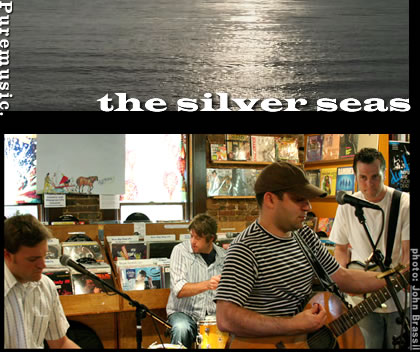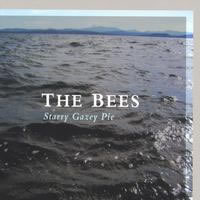
A Conversation with
Daniel Tashian (continued)
PM: Is this the second record from the group?
DT: That's right.
PM: So what's the first one, and will that be available or--

DT: Well, the first one was called Starry Gazey Pie. It came out in 2001. And let's see, Starry Gazey Pie, it's currently available, I think. You can get it on iTunes and you can get it on CDBaby.
PM: Okay, good. [There are also a couple of audio clips from Starry Gazey Pie on our Listen page, along with four from High Society.]

So this record here, High Society, those are all your songs, right?
DT: That's right--well, a couple co-writes with Jason Lehning.
PM: Right. And the songs draw freely and liberally from your many American pop sources from the '70s and beyond. Would you call that accurate?
DT: Yeah, yeah.
PM: It's not really outlandish to call it "soft rock" in a lot of spots, is it?
DT: No, no. And that's really what I love.
PM: That's what I love. I'm a closet soft rock guy.
DT: I was talking to Josh Rouse about this the other night. And we decided, really, it all comes back to Christine McVie.
PM: [laughs]
DT: Because really, she was the one, if you think about it--and it's really interesting, in Fleetwood Mac, how like the really blissful pop sound that you equate with Fleetwood Mac, it's her. A lot of it has to do, too, with Lindsay Buckingham's guitar sound. But when Lindsay sings, it's not really blissful, it's more rock.
PM: Oh, yeah, he's much more angst-y.
DT: Yeah, he's angst-y. And same thing with--and as wonderful a voice as Stevie Nicks has, and she is a terrific singer, really, it's Christine that had--you know, [singing] "When the loving starts and the lights go down"--and those songs that have these really blissed-out melodies. That's what I really responded to as a child. Rumors was a huge record in our house.
PM: Oh, yeah.
DT: Constantly spinning. [Let's hear a clip of "Say You Love Me" from their 1975 album, Fleetwood Mac.]
PM: And High Society being a soft rock record--and I'm tickled to see that you love that as I do--it's very mass-media friendly. Although the radio today is in its peculiar state, still, soft rock rules, and it shows up everywhere in the culture.
DT: Yeah. Well, I'm glad you say that. We're going to add a few other touches to the next project we do, but even this one--it's those layers and that sound and really a melody that's kind of exciting.
PM: Yeah, absolutely, it's about a groove and a melody, every time. And I hope that High Society is getting shopped heavily to TV. I mean, TV is breaking so many artists now.
DT: That would be great.
PM: Somebody is on that, I assume?
DT: Well, let's see, yeah, I would assume so. I think the label, they've got some of the best and brightest people in the industry that are thinking of pitches.
PM: Forward thinkers, yeah.
DT: My thing, Frank, a dream, would be a sitcom theme.
PM: Well, just what I was about to say, I think the title song alone deserves its own movie or TV show.
DT: That would be great.
PM: There, I said it, there should be a frickin' movie or a show called High Society.
DT: Yeah. Well, that would be great. Anyway, that would be my dream. So if you know anybody who is starting a sitcom--and actually, it almost happened to my dad. He had a song called "Mr. Sunshine" that he wrote in the '70s. And apparently the guy who was on Three's Company, John Ritter, right before he died he was working on a sitcom called Mr. Sunshine, and he was going to use that song.
PM: Oh, my God.
DT: That would have been great for my dad, but...
PM: What a drag.
DT: The song is very--it's got that thing--what's that song "Welcome Back"--
PM: John Sebastian.
DT: John Sebastian is the man. I mean, that guy is my hero.
PM: And he hadn't made diddley on all those great songs. The first thing that bought him a house and set him up was Welcome Back Kotter. [Okay, let's also hear a clip of "Welcome Back," which became one of the biggest singles of 1976.]
DT: Yeah, well good for him, he deserved it.
PM: Yeah, because he signed them all away.
DT: It happened to those guys, those older guys. I'm sorry to hear that. But I mean, damn, what are you going do? You can't--
PM: You just got to keep writing a song, playing a song, what are you going do?
You're a guy with your finger on the pulse of any number of things. So before we get off, I want to see if you'll say anything about the crazy state of the music business, or where you think it's going, or any of that stuff.
DT: I can only speak from experience, but I can say that people love music, and that they love records, and they love things that have depth and soul. And I think that the desire for new songs to describe new feelings is always there. I mean, as the world changes we have new emotions and new feelings, and we need new songs to describe the way people feel now, or reinterpreting old songs. So I think the need for songs will always be there as long as there is humanity on the planet.
It's a very primal need that people have for songs that express what they feel and the lives they live. I think people put themselves in the shoes of the singer. When they hear a song they like to think, "This is a song I could sing to someone that I love," or, "This is a song that says how I feel about this." People need those vehicles for their emotions. So I think, for songwriters, the outlook looks good. I think for models that don't really have any talent, but they're just sort of poster people for something else, I don't know, it might be a little bit dicey.
PM: [laughs]
DT: Forgive me if I'm elaborating too much here--
PM: You couldn't for me.
DT: I think prospects are good. I also think it's just really interesting. I wish I could make a prediction, but the only thing I feel certain of is that people constantly need new songs. And I buy records. I can't wait for a record from on artist that I really love--like Feist--for it to come out.
There are careers that are really happening. And there are people who were really on the skids for a while and nothing was happening with them and they're having these amazing comeback tours, like Crowded House, and bands like that. I mean, 10 years ago Crowded House played at 328 [a defunct Nashville venue] and just barely had enough people in there, and now they're packing the Ryman and getting a standing ovation before they play a note. So sometimes it takes a while before the culture really appreciates things. But it will get it eventually if you just keep hammering at it.
[laughter]
DT: Anyway, that's my philosophy.
PM: Well, I'm glad you continue to hammer away. You're certainly one of my favorite players out there.
DT: Oh, thank you, Frank. Thank you always for your encouragement and support.
PM: You bet. It's great to talk this way today. We wish you the best of luck with High Society. I'm sure it's really good to do great things.
DT: Oh, I hope so. Thank you for that. All right, take care, Frank.
![]()
|
listen to clips |
| print (pdf) | |
| the silver seas online | |
| cheaplullaby.com | |
| the silver seas myspace | |
| daniel's blog | |
| daniel's myspace | |
| jasonlehning.com | |
| guilty pleasures myspace | |
| photo thanks: | |
| John Brassil (the gig shots) | |
| Paul Felton (solo ukulele) | |
| Heidi Ross (bathrobes) | |
| Liz Norris (4 chairs) | |
| Javier Moya (DT with Josh) | |
| puremusic home |
